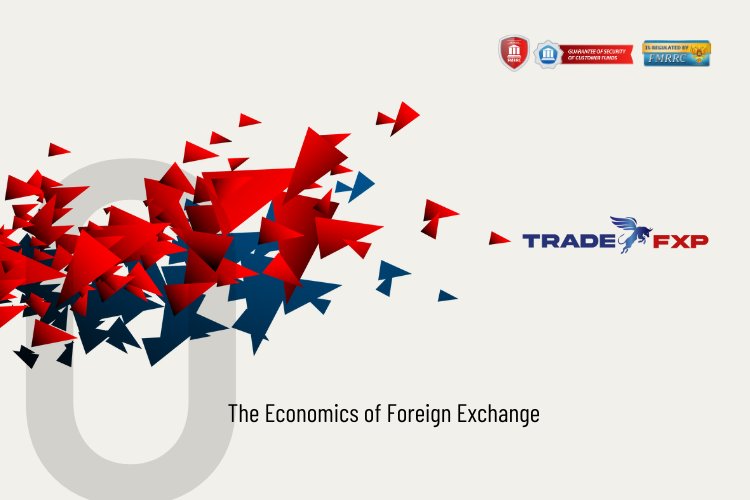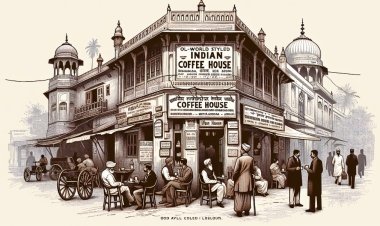The Economics of Foreign Exchange Market
Gain valuable insights into the intricate workings of the foreign exchange market at TradeFXP. Understand its economics, effects on global trade, and much more.

If you want to enter a world of cruel, harsh reality and an intriguing environment where you can feel bored while also feeling delighted by obtaining financial freedom, then you must know what we are sharing here. This is where people grow money and get richer every day by making wise financial decisions. Let's dive into the fascinating world of the foreign exchange market, investigating its economic underpinnings and the forces that influence it. Whether you're an expert trader or just getting started, TradeFxP can help you navigate this volatile market and make smart decisions to maximise your currency trading.
Introduction to Foreign Exchange Market
With an average daily trading volume of almost 6.6 trillion dollars, the foreign exchange market is one of the most important marketplaces in the world. This market promotes international trade and enables nations to focus on manufacturing commodities and services in which they have a comparative advantage.
Take the general shop as an example. If the general store were a currency market, the items would be the imports and exports of various national brands. By investing in well-liked companies, you can make money where there are more brand sales.
- The foreign exchange market has a daily trading volume of around 300 billion US dollars combined.
- The New York Stock Exchange, Nasdaq, and Tokyo Stock Exchange are the three largest security markets.
Globalization and Comparative Advantage
Businesses have grown to rely on complex global supply chains in today's linked and globalised environment to streamline the production of goods and services effectively. With the aid of the comparative advantage concept, nations operate within this global framework by concentrating on producing what they do best.
Each nation has an inherent advantage over others in producing particular goods or services, frequently as a result of resources, technology, trained labour, or favourable climatic circumstances.
Recognising their comparative advantages enables nations to improve their production methods, better allocate resources, and increase productivity. In order to increase overall efficiency and productivity, specialisation enables countries to concentrate on manufacturing particular items or services in which they excel. Because nations can swap their specialised goods for goods that they are less effective at manufacturing, international trade creates a win-win situation for all involved.
- Comparative advantage allows countries to focus on producing goods or services they can produce more efficiently.
- Trade was once seen as a luxury but is now the norm due to globalization.
- Germany specializes in high-quality manufacturing while China excels at mass production.
Example of Comparative Advantage
Germany could easily build iPhones, but the manpower shortage and strict environmental rules would make it pricey. China, on the other hand, has the ability for mass production but lacks the knowledge of expensive luxury vehicles.
- Production of the iPhone is expensive due to Germany's high labour costs and rigorous regulations.
- China is well suited for mass production of products like iPhones due to its sizable low-skilled workforce force.
- Each nation concentrates on what it does best; for example, Germany makes vehicles, while China makes phones.
Currency Trading and the Foreign Exchange Market
To promote international trade and investment, nations engage in currency trading. Different currencies are needed for transactions when businesses import and export products and services across borders. The foreign exchange market, sometimes known as the forex market, is a secondary market created by this need for currency conversion.
The relative worth of currencies is determined by exchange rates when they are bought and sold in pairs on the forex market. Participating in this vibrant market are traders, investors, banks, and governments looking to capitalise on exchange rate swings.The liquidity, size, and accessibility of the forex market make it one of the biggest financial marketplaces in the world, enabling both international trade and economic connections.
- Currency trading allows countries to exchange their specialized products using their respective currencies.
- Chinese iPhone manufacturers prefer to be paid in their currency, while German car manufacturers prefer euros.
- The foreign exchange market facilitates currency trading alongside the exchange of goods and services.
The Influence of the Foreign Exchange Market
Over the course of world trade and finance, the foreign exchange market has had a considerable impact. The largest financial market in the world, it enables currency exchange for business transactions, financial transactions, and travel. Exchange rate fluctuations have an impact on a nation's trade balance and economic growth by reducing export and import competitiveness.
Asset values, including those of stocks and bonds, are impacted by movements in the forex market, which also affect investor sentiment and capital flows. To maintain the stability of their currencies and control the state of the economy, central banks utilise currency interventions. The volatility of the market can also be increased by currency speculation.
Governments, firms, and investors must navigate the complexity of the global economy by having a solid understanding of the foreign currency market's dynamics.
- Global trade and the liberation of currencies have led to the market's influence.
- Companies, investment firms, and governments are major players in the foreign exchange market.
- Businesses need to transfer money and convert it into local currency when expanding internationally.
- Foreign exchange risk can impact businesses' profitability due to currency fluctuations.
Retail Transactions vs. Major Players
Retail transactions make up a relatively tiny part of total trading volumes in the foreign currency market. Although individuals and small businesses known as "retail traders" frequently engage in the forex market, they often trade lesser positions in comparison to major players like financial institutions, corporations, and central banks.
Due to their significant financial resources, these key players control the market. They engage in large-scale currency transactions to promote international trade, protect against currency risks, or execute monetary policies. Retail transactions, despite having a lesser market share, help to maintain market liquidity and give private investors access to the foreign exchange market.
- Most people have limited exposure to the foreign exchange market through retail transactions like online shopping or holidays.
- Companies, investment firms, and governments play more influential roles in the market.
- Businesses require currency conversion for international operations, while investors seek potential returns.
Investors and Derivatives
Due to the possibility of profits through derivatives, investors are drawn to the foreign exchange market. Investors use derivatives as financial tools to reduce risk, make predictions about future prices, or improve portfolio performance.
Contracts known as derivatives derive their value from underlying assets like stocks, commodities, currencies, or interest rates. Futures, options, and swaps are examples of common derivatives. Derivatives are used by investors to protect against prospective losses or to acquire exposure to assets without actually owning them.
With the potential for profit in both rising and falling markets, derivatives provide flexibility in managing market volatility. Derivatives have inherent risks because of their complexity, therefore investors must thoroughly evaluate and comprehend these instruments before incorporating them into their investment strategy.
- Derivatives are financial instruments whose value is derived from another asset.
- Investors make bets on currency value changes relative to their home market's currency.
- Derivatives help companies mitigate foreign exchange risk by stabilizing profits regardless of currency fluctuations.
Government's Role
Governments have a big impact on the economy because they control monetary, fiscal, and financial markets. They seek to uphold stability, encourage growth, rein in inflation, and deal with economic difficulties. To guarantee the welfare of its citizens and the overall health of the economy, governments also oversee taxation, trade policy, and social welfare initiatives.
- Some governments aim to reduce their currency's value on foreign exchange markets.
- Chinese government artificially devalues its currency by buying large amounts of foreign currencies.
- This strategy increases reserves of foreign currencies but raises concerns among conspiracy theorists.
The British Pound's Value
The dynamics of supply and demand determine how much the British Pound (GBP) is worth on the foreign currency market. Interest rates, economic performance, geopolitical happenings, and market emotion all have an impact on how valuable it is in relation to other currencies.
Although it has experienced difficulties as a result of Brexit, the British pound has historically been the most valuable currency.
- Currently, there is no specific reason why the British Pound remains the most expensive currency.
- In the past, when currencies were tied to precious metals, one US dollar was exchangeable for 1.5 grams of gold.
Share Prices and Intrinsic Value
The share prices of Seaboard Corporation and Amazon are displayed in this section, showing the significance of taking into account how many shares each firm has.
- Seaboard Corporation's share price is around $4200, while Amazon's share price is approximately $1813.
- The share prices alone do not provide a clear indication of a company's size or value.
- Amazon is significantly larger than Seaboard Corporation in terms of market capitalization.
Confusion with Share Prices
Here we examine why people often find it confusing to understand the value of shares compared to tangible items with intrinsic value.
- People are more accustomed to purchasing things with intrinsic value, such as cars.
- The price of a Toyota Corolla or a McLaren 720s reflects their respective values and features.
- Shares and derivatives do not have intrinsic value; they are essentially pieces of paper or digital entries.
Determining Value
The true value of shares and currencies is determined by what someone is willing to exchange for them.
- Shares and currencies only hold value based on their exchangeability.
- The piece of paper or digital representation itself does not determine its worth.
Please join us for more information and to know how to make profits in the Forex market without the troubles of trading by yourself. CLICK HERE to join.
To read why you should be with us, click here
To open an account, click here.
To see our regulation certificate: click here.
To see our news with the IFMRRC: click here.
For claims, click here.
For the main site: click here.
For blogs and articles: click here.



 admin
admin 










